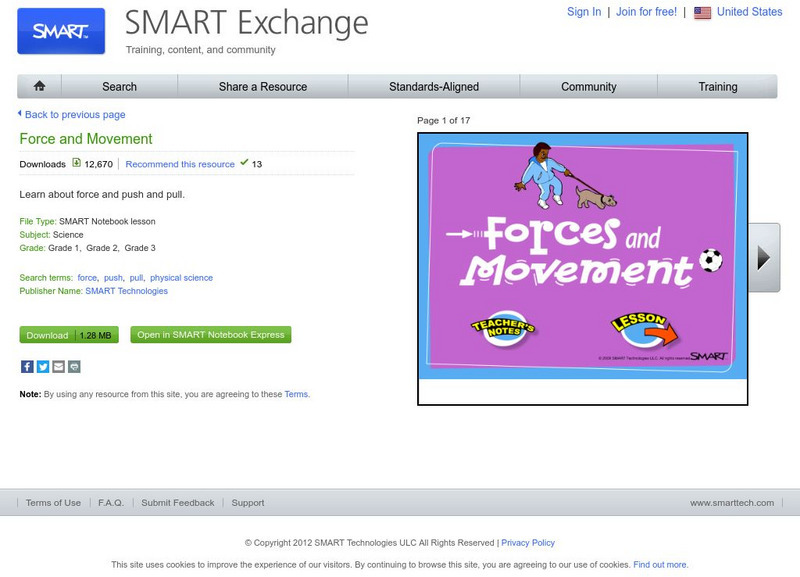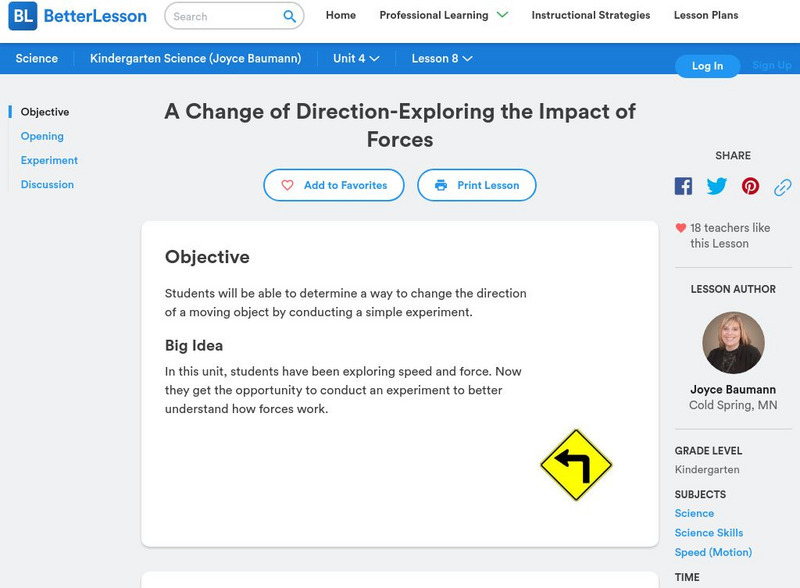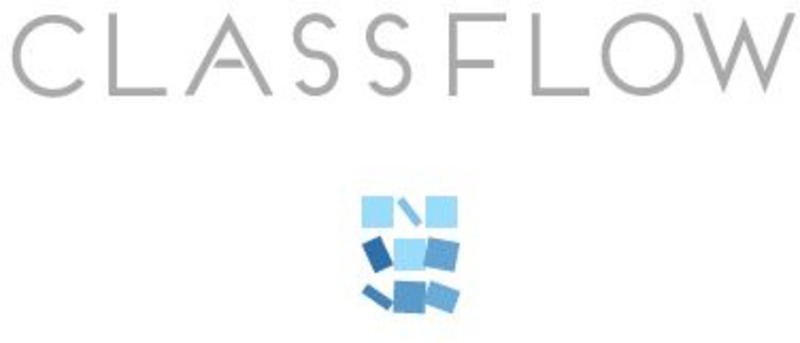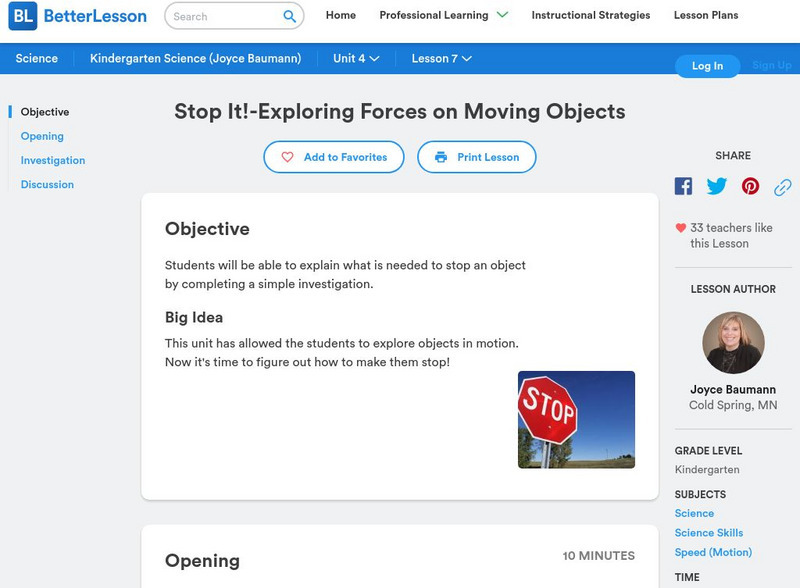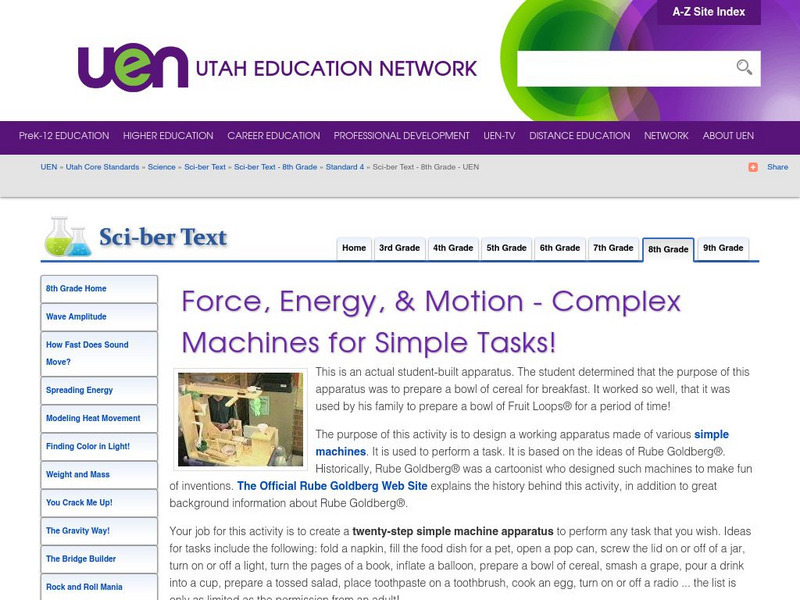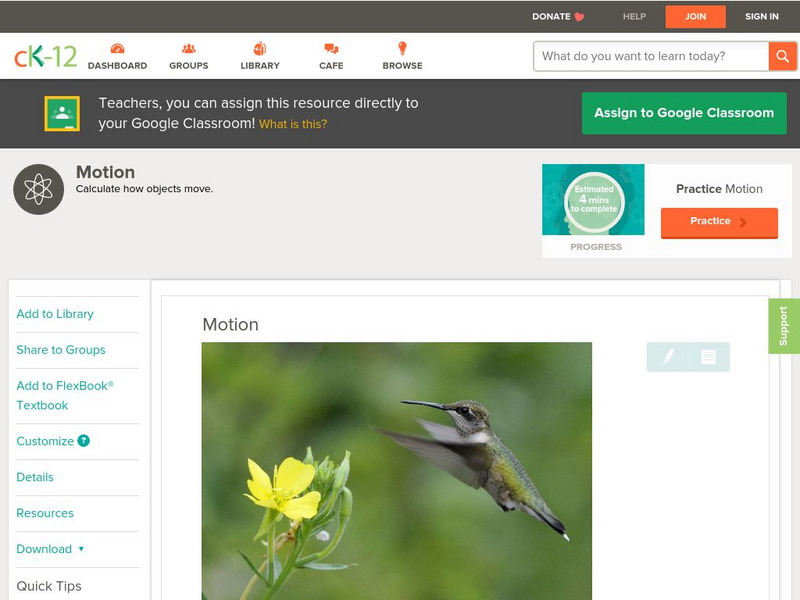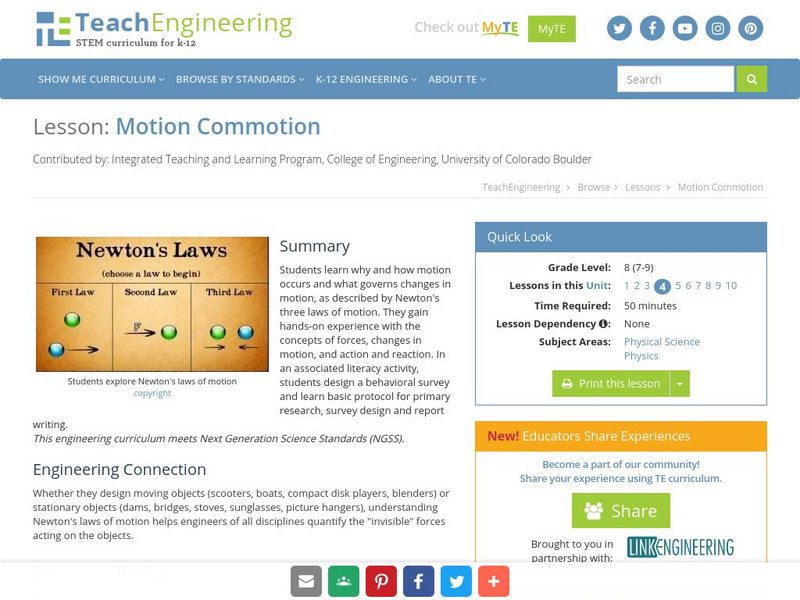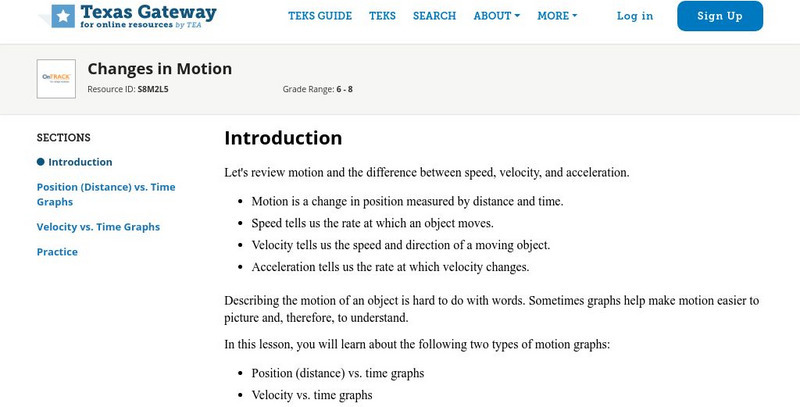Hi, what do you want to do?
Physics Classroom
The Physics Classroom: Vectors Motion and Forces in Two Dimensions
Three complete tutorials on vectors and two dimension forces and motion. Lessons include informational text, interactive activities, animations, and quick, interactive comprehension checks along the way.
SMART Technologies
Smart: Force and Movement
Learn how pushes and pulls relate to theconcept of force and motion.
Better Lesson
Better Lesson: A Change of Direction Exploring the Impact of Forces
Students will be able to determine a way to change the direction of a moving object by conducting a simple experiment. Included in this lesson are videos of the activity in action, a printable recording sheet, pictures of the set-up for...
Better Lesson
Better Lesson: A Change of Direction
Students will make predictions and conduct an experiment using marbles to figure out what types of things can cause a moving object to change direction. Included is a video of the lesson in action, pictures, discussion questions, and a...
Other
Bscs: Forces Lesson 2: Representing Forces
What makes something start to move? What makes something stop moving or change direction? This hands-on lesson will show students that forces acting on an object have a strength and a direction that can be represented by arrows of...
The Wonder of Science
The Wonder of Science: K Ps2 2: Motion Design Solution
The NSTA vetted source includes resources to teach how to analyze data to determine if a design solution works as intended to change the speed or direction of an object with a push or a pull. Included are assessment ideas, videos,...
NC State University
The Engineering Place: Roller Coasters [Pdf]
A instructional activity where students construct a roller coaster and test it under different conditions to learn about force and motion.
BBC
Bbc: Gcse Bitesize: Forces and Elasticity Aqa
This lesson focuses on forces and elasticity. Forces are responsible for changing the motion of objects. If more than one force is present, the shape of an object can also be changed. A link to a test is provided.
ClassFlow
Class Flow: Forces in Motion
[Free Registration/Login Required] This lesson explores forces, and how they react to the world around us. It also discusses Newton's Laws of Science.
Better Lesson
Better Lesson: Stop It! Exploring Forces on Moving Objects
Students will be able to explain what is needed to stop an object by completing a simple investigation. Students will experiment with Hot Wheel cars and record their predictions on a recording sheet. Included are videos of the lesson in...
TeachEngineering
Teach Engineering: Energy of Motion
By taking a look at the energy of motion all around us, students learn about the types of energy and their characteristics. They first learn about the two simplest forms of mechanical energy: kinetic and potential energy, as illustrated...
PBS
Pbs Learning Media: Curious George Stem: Ramp N Roll Lesson Plan
Explore how different objects move down ramps in this Curious George instructional activity. Students will make predictions about how objects will roll down different heights of ramps.
University of Colorado
University of Colorado: Ph Et Interactive Simulations: Gravity and Orbits
An interactive simulation that teaches about gravitational force, circular motion, and astronomy by manipulating the sun, earth, moon, and a space station to observe the effects of gravity and orbital paths. This simulation can either be...
Better Lesson
Better Lesson: Collision Course (Part 2)
This is part 2 of a two-part lesson on understanding how speed changes when two objects collide. Students will conduct an experiment, collect data, and draw conclusions about the changes in energy that occur when objects collide....
Utah Education Network
Uen: Force, Energy, and Motion: Complex Machines for Simple Tasks!
Designed for Grade Eight, this collection of lessons provides information, examples and quizzes related to simple machines. Elementary students studying this topic will find this site informative as well.
CK-12 Foundation
Ck 12: Physical Science: Motion
[Free Registration/Login may be required to access all resource tools.] Definition of motion and how it is related to frame of reference.
BioEd Online
Bio Ed Online: Balloon Blast
In the following lesson plan students are asked to devise a plan to measure the distance of a balloon's flight, predict the direction a balloon will travel as it deflates, learn about Newton's Laws of Motion, experience Newton's Third...
Better Lesson
Better Lesson: Falling Objects
Students will determine if objects fall at the same speed by testing a variety of objects as they let them fall from above. They will learn that gravity is the force that is pulling on the object. Included in this lesson is a video about...
Physics Classroom
The Physics Classroom: Vibrational Motion
In this article the concept of vibrational motion and its relationship to waves is introduced.
Physics Classroom
The Physics Classroom: Motion of a Mass on a Spring
This tutorial investigates the motion of a mass on a spring and how a variety of quantities change over the course of time. Such quantities will include forces, position, velocity and energy - both kinetic and potential energy. Take the...
TeachEngineering
Teach Engineering: Motion Commotion
Students learn why and how motion occurs and what governs changes in motion, as described by Newton's three laws of motion. They gain hands-on experience with the concepts of forces, changes in motion, and action and reaction. In an...
Texas Education Agency
Texas Gateway: Changes in Motion
In this lesson, you will learn about position vs. time graphs and velocity vs. time graphs and how to use them to solve problems.
Utah STEM Foundation
Utah Stem Action Center: Push or Pull?
This super simple activity for kindergarten-age students requires no materials and can be done inside or outside, or both and explores forces and motion.
TeachEngineering
Teach Engineering: Projectile Magic
Students watch video clips from October Sky and Harry Potter and the Sorcerer's Stone to learn about projectile motion. They explore the relationships between displacement, velocity and acceleration and calculate simple projectile...






